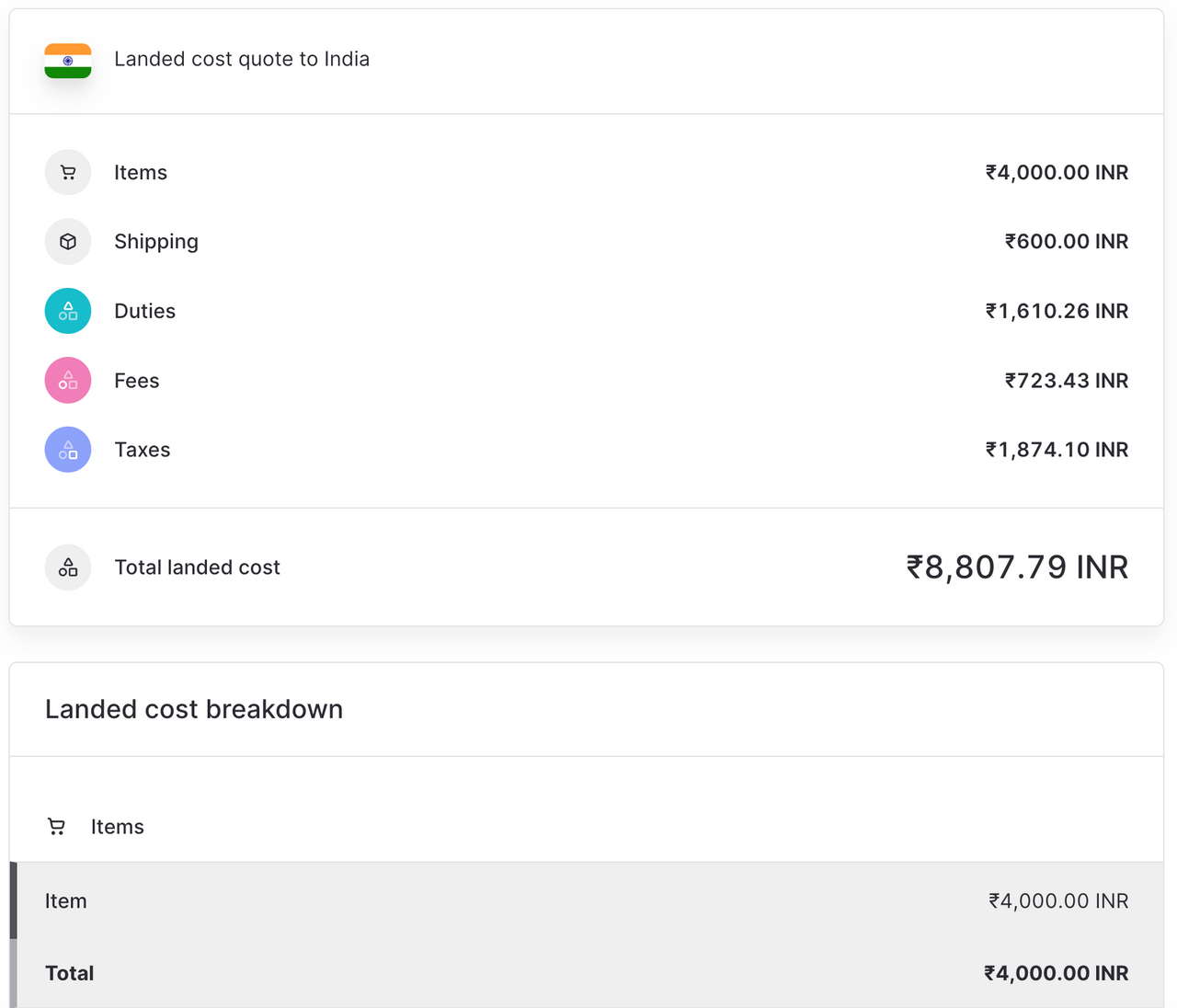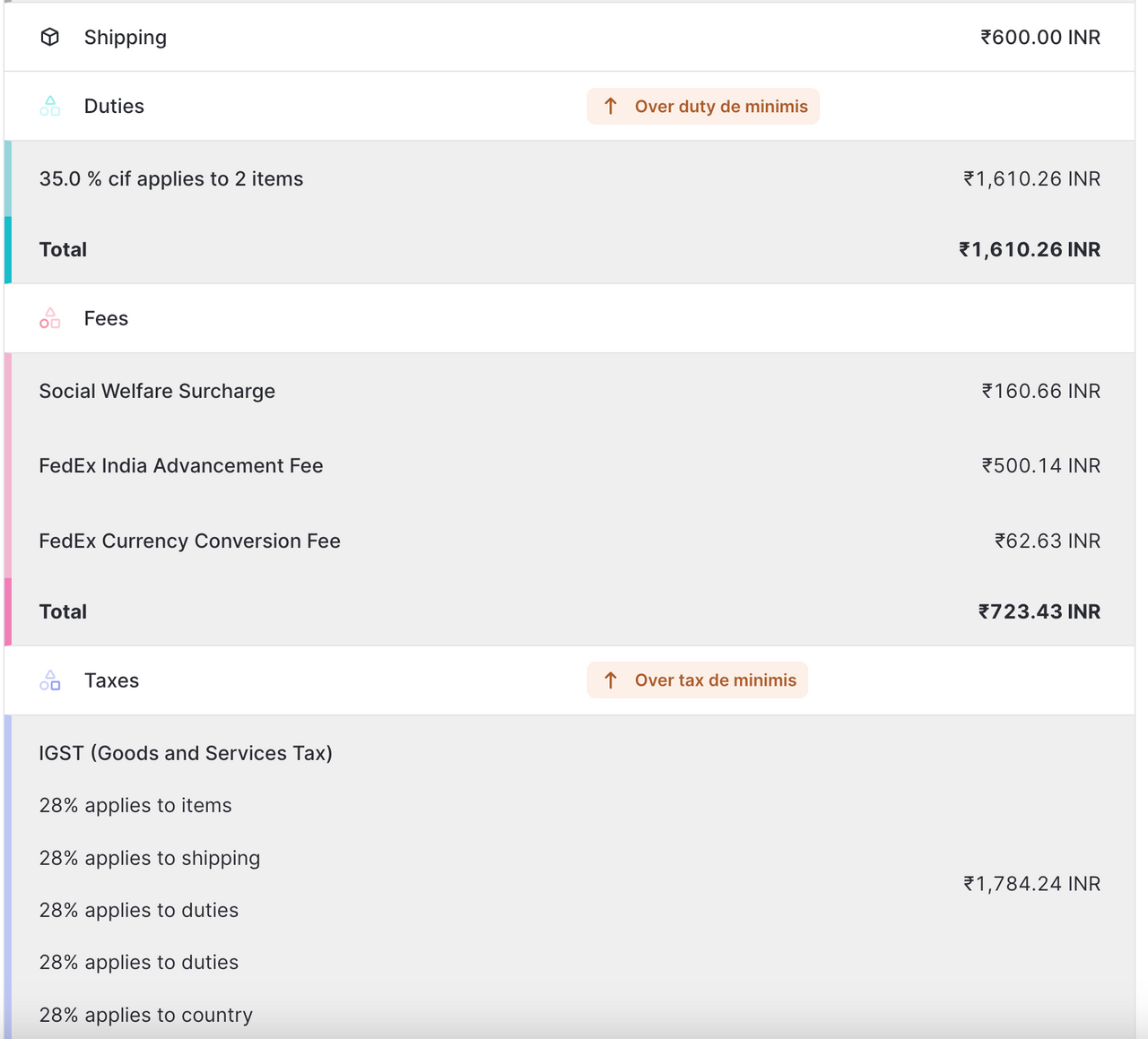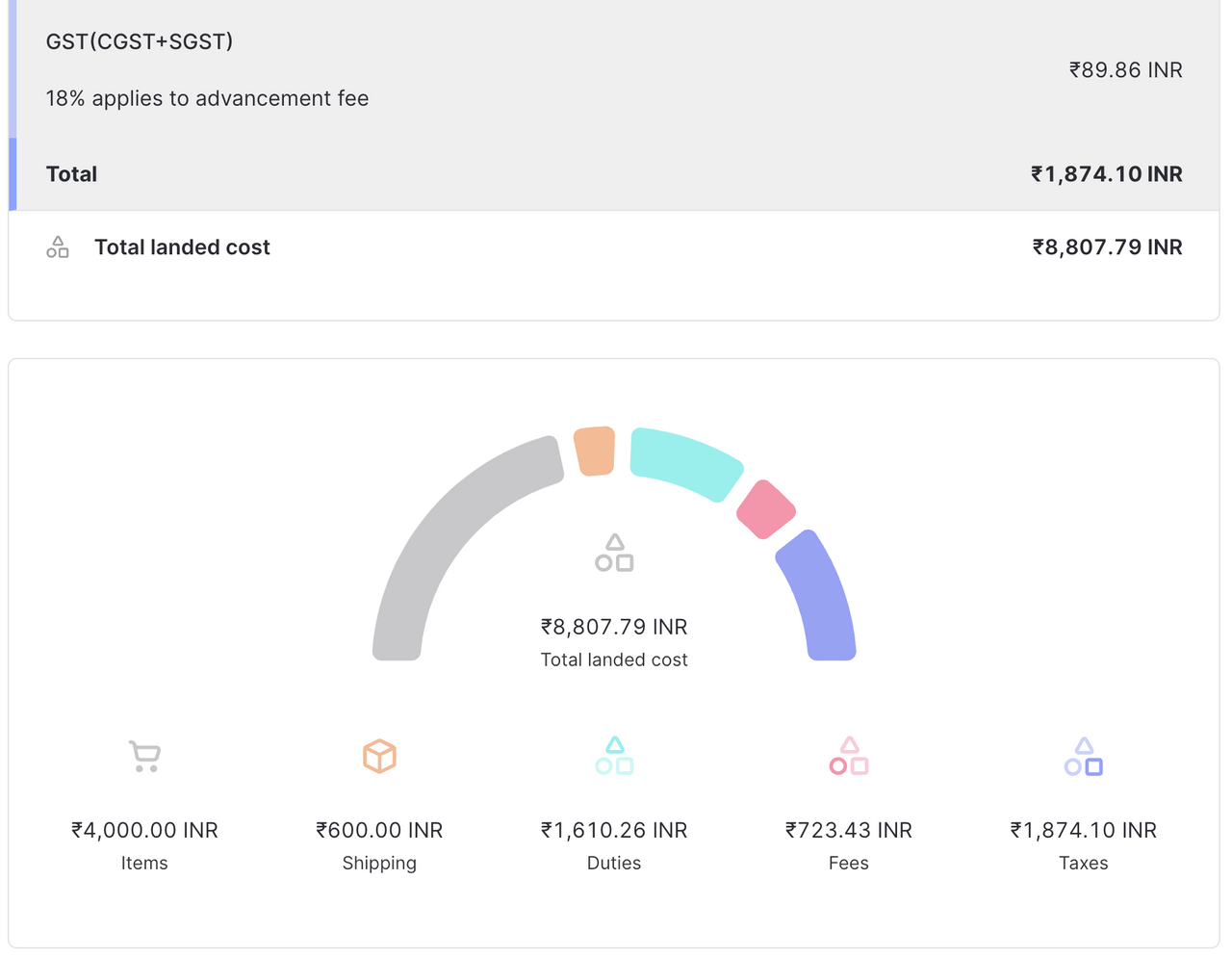Ease of importing goods score: D
Ease of doing business 3/5
- India imposes high import fees, and Indian consumers and companies are immensely price sensitive.
- Structural reforms, increase in government investments, and technological advancements have facilitated more trade in recent years.
- India’s government eased foreign direct investment (FDI) restrictions, which makes trade more attractive.
- While they’re improving, India’s telecommunication and infrastructure hinder India’s economic status and ability.
Landed cost fairness 1/5
- India does not operate a de minimis, so fees will be levied on all imports, which is unfavorable for landed cost.
- India imposes one of the highest tariffs on imports, which is extremely disadvantageous for landed cost.
Flexibility of legal regulations 2/5
- While India has implemented reforms to improve legal regulations, the requirements for importing are quite extensive and they're often non-transparent and unpredictable.
Availability and accessibility of shipping 4/5
- India’s remote location can increase transportation costs, but all major carriers ship to India.
Accessibility and variety of payment methods 5/5
- India operates a plethora of payment methods, including Mastercard, VISA, American Express, PayPal, PayTM, PayUMoney, Google Pay, Apple Pay, Skrill, PayZap, Pockets, and RuPay.
Market opportunity 4/5
- India has a large and healthy middle class, making it an attractive consumer market.
- While India is the most populous country in the world, less than half of the population shop online.
Key stats for India
| Population | 1.4 billion (2022) |
| GDP | 3.5 trillion USD (2022) |
| GDP per capita | 2,320 USD (2022) |
| Internet penetration | 60% of the population use the internet (2022) |
| Ecommerce users | 37% of the population shop online (2022) |
| Leading categories | Electronics, fashion, and home furnishings |
| Preferred online payment method(s) | COD, debit card, and credit card |
| Languages | Hindi, Bengali, and Telugu |
| Currency | Indian rupee/INR/₹ |
Landed cost for India
The landed cost for a cross-border transaction includes all duties, taxes, and fees associated with the purchase. This includes:
- Shipping
- Duties
- Taxes
- Fees (currency conversion, carrier, broker, customs, or government fees)
Indian de minimis, tax, and duty
CIF: CIF (cost, insurance, freight) is a method for calculating import taxes or duties where the tax is calculated on the cost of the order plus the cost of freight, insurance, and seller's commission.
Further explanation of de minimis, tax, and duty provided below
Duty and tax de minimis
- Duty and tax de minimis: 0 INR
Applied to the CIF value of the order
De minimis value
Normally, duty and tax are only charged on imports where the value of the import exceeds the minimum value threshold (de minimis). However, India does not have a de minimis, which means duty and tax fees are charged on all imports. The only time goods are exempt from duty and tax is when they receive preferential treatment through trade agreements.
Import tax
- Standard rate: 28%
Applied to the CIF value of the order
Goods and services tax (GST)
GST is made up of three different kinds:
- Central GST (CGST): A fee collected by the central government for sales in all states.
- State GST (SGST): A fee collected by each state for sales within a state.
- Integrated GST (IGST): A fee collected by the central government for sales between states.
The standard combined tax rate for goods being imported into India is 28%.
Import duty
- Average rate 35%
Applied to the CIF value of the order
Duty rate
While a duty rate of 35% for goods imported into India is most common, India has some unique duty charges that may apply to the goods you wish to import.
Other import fees
Basic Customs Duty (BCD)
- BCD is based on the product's HS code and its origin. The rates range from 0% to 100%.
Countervailing Duty (CVD)
- CVD rates depend on the product; the fee ranges from 0% to 12%.
Special Additional Duty (SAD)
- A 4% SAD fee is applied to some imported goods that put domestically manufactured goods at a disadvantage due to sales tax.
Compensation cess
- Compensation cess is charged on certain products, such as tobacco and products that cause pollution (coal and cars).
Landed cost examples
Below is a sample landed cost breakdown for India calculated using Zonos Quoter. Since the de minimis is 0 INR, duty and tax will always apply:
Landed cost for a shipment to India:



Trade agreements
India has at least 13 trade agreements that offer a zero or highly discounted duty rate for goods manufactured in participating countries.
India is a member of the World Trade Organization
As a member of the World Trade Organization (WTO), India must abide by the most-favored-nation (MFN) clause, which requires a country to provide any concessions, privileges, or immunities granted to one nation in a trade agreement to all other WTO member countries. For example, if one country reduces duties by 10% for a particular WTO country, the MFN clause states that all WTO members will receive the same 10% reduction.
Customs resources
India’s Customs authority
Department of Revenue, Ministry of Finance, Government of India
Customs refund in India
Claim a refund for Indian Customs
Note: Talk to your carrier about customs refunds.
Shipping and compliance
Top courier services:
- FedEx
- DHL
- UPS
- USPS
- DTDC
- BlueDart
- Shiprocket
Depending on the courier, additional shipping fees may include:
- Tracking
- Insurance
- Fuel surcharge
- Remote delivery charge
- Signature fee
- Overweight or oversized fee
- Special handling fee
- Dangerous goods fee
- etc.
Documentation and Paperwork
Always required:
- Bill of lading or air waybill
- Commercial invoice
- GST number
Sometimes required:
- Import license
- Bill of entry
- Packing list
- Freight certificate
- Insurance certificate
- Certificate of origin
For all non-document shipments, one of the following documents must be provided by the India-based recipient and presented to customs for the shipment to be cleared:
For individuals:
- Aadhar Card
- Personal PAN Card
- Document of proof of address required if this form of ID is used.
- Voter's Identity Card
- Passport
- Driving License
- NREGA Card
For businesses (one document each for proof of identity and address required):
- Proof of ID:
- GST Certificate
- PAN Card
- Proof of address:
- Bank account statement
- Electricity bill
- Telephone bill
- Rent agreement
Prohibited, restricted, and controlled imports into India
Government agencies regulate imports. Under India’s EXIM Policy, regulation of Open General License (OGL) imports are labeled as freely importable without restrictions or a license. Items that do not fall under the OGL are prohibited or restricted items. There are certain imports that only the government is allowed to approve (canalized). See here for more details.
Restricted items are different from prohibited items. Prohibited items are not allowed to be imported into a country at all. Restricted items are not allowed to be imported into a country unless the importer has approval or a special license. Controlled goods have military or national security significance.
Prohibited items:
- Wild animals and animal products
- Certain animal fats, including lard and mutton tallow
- Petroleum coke
- Ivory or items made from ivory
- Mink or fox in any form
- Clothing made from wild animals
- Red sandalwood
- And more
Restricted items:
- Alcoholic beverages
- Australian lupin seeds
- Baby gender test kits
- Bunker oil sample (for analysis)
- Batteries or power banks, especially lithium
- Catalogs, advertising brochures, and pamphlets
- Cereals other than seed quality
- Chemicals (hazardous and non-hazardous)
- Circuits and circuit boards
- Coal and firewood
- Coffee
- Computer software
- Cotton seeds
- Credit cards and credit card blanks
- Deeds
- Diplomatic mail
- Drugs (prescription and non-prescription)
- Electronics, including things such as televisions and cell phones
- Fabrics and fabric samples
- Films: 8mm, 16mm & 35mm, entertainment, promotional, or training
- Fire extinguishers
- Fireworks
- Foodstuffs
- Gems and jewelry containing precious and semi-precious metal/stones in all forms is prohibited regardless of the value and must be shipped as Broker Select Option (BSO) to Export Oriented Units (EOU), Special Economic Zones (SEZ), or Santacruz Electronics Export Processing Zone (SEEPZ) only
- Grain samples
- Items subject to the Atomic Energy Act, 1962
- Papers for printing checks & currencies
- Weapons/ballistics and materials to make them
Frequently asked questions
Do I need a business license or business registration to sell online to India?
When selling to India, business owners are required to have a current account in the name of their business. To have a current account, business owners need to make sure that their business is a legal entity, is registered with the taxation authorities, and has a business license.
An LLP for a foreign company selling in India can face obstacles due to strict foreign investment regulations. However, the registration process for a private company is less expensive, easier, and requires fewer documents. It stipulates that at least two (and no more than 200) shareholders of non-transferable shares are needed, with a minimum share capital of 100,000 INR (approximately 1,500 USD). Registration for a private company also requires at least one director who is a resident of India or has lived in India for more than 182 days in the previous financial year.
India country guide
Learn about cross-border ecommerce, shipping, and importing.
If you are looking to grow your ecommerce business into India , you’ve come to the right place. Keep reading to learn everything you need to know about selling goods into India.
, you’ve come to the right place. Keep reading to learn everything you need to know about selling goods into India.